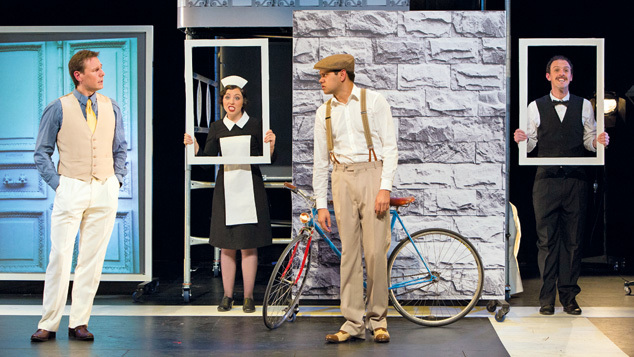School for Wives
The Playhouse, Canberra Theatre Centre
October 2012
I had been very impressed with Bell Shakespeare’s Macbeth, so thought it would be okay to take Him Outdoors along to their production of School for Wives, although Molière can be a tough sell. We were both tired and hungover so it would have to be a top-notch production to keep us entertained, and fortunately it was.
The language has been translated and modernised with an Australian flavour (huge plaudits to Justin Fleming), but the rhyming scheme has been kept, which adds an extra self-aware dimension. The entire production is self-aware, or post-modern if you will, using limited props, and wheeling in backdrops to create scenes in conjunction with seriously intelligent lighting (set built by Malthouse Theatre; lighting designer, Niklas Pajanti).
It begins with two characters chugging along in a motor car, providing all their own ‘special effects’. This sets the tone for the rest of the show, which is fast, funny, wry and sardonic. It’s entertainment, but it’s not light.
The story is preposterous, as you would expect from a seventeenth-century comedy featuring disguise and mistaken identity, but the audience is invited to mock the plot while caring for the characters – a difficult feat accomplished superbly by director Lee Lewis. She and the designer, Marg Horwell, have explored every detail in the 1920’s Parisian setting, from fabulous costumes (Costume supervisor, Taryn Van Kan) to mannerisms of loveable rogues and caddish fops – the mixture of references gels seamlessly to create a timeless montage.
The banter is brilliant once your ears become accustomed to the rhythm (it took about five minutes of intense concentration, more than adequately rewarded with the ability to anticipate gag placement), and the physical comedy conversely elevates the performance to a higher plane. It would be wrong to use the term slapstick, as that may suggest a base art-form. In several sequences the puppet-like movements, particularly from the taciturn servants Alan (Andrew Johnston) and Georgette (Alexandra Aldrich), are almost balletic (Movement director, Penny Baron). They have a touch of Manuel and Polly meet Peirrot and Columbine.
All the acting is faultless and, although the main characters could be one-dimensional, all are given depth. Harriet Dyer plays Agnes, the ingénue, with such candour that she is way more than the drippy but pretty simpleton this role would usually imply. Her purity and passion collide convincingly, and she offers hope for the future of love, marriage and (perhaps not in the original but certainly in this adaptation) equality.
Her love interest, Horace (Meyne Wyatt) is a loveable fool with a ready laugh and evasive wit, cleverly avoiding a patronising Aborigine stereotype with a layered performance. And although we should dislike the villain of the piece, Arnolde, who attempts to manipulate the suggestible Agnes into matrimony, John Adam imbues him with enough integrity of action, not to mention audience rapport and undeniable charm, that he is a firm favourite. Even the role of friend, Chris, who is mainly present to provide exposition and explanation, is handled with aplomb by Damien Richardson.
Mention must also be made of the music (Composer, Kelly Ryan), which underpins and highlights each action, reaching a crescendo in the show-stopping bows. I’m not entirely sure what my expectations were, but they were well and truly exceeded.



No comments:
Post a Comment